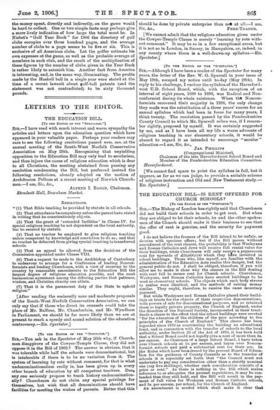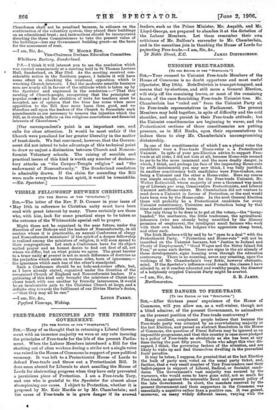THE EDUCATION BILL—IS RENT OFFERED FOR CHURCH SCHOOLS P
ITO TER EDITOR OP THE " SPICITAEOR."1
Snr,—The Bishop of London has rightly said that Churchmen did not build their schools in order to get rent. But when they are obliged to let their schools, he and the other spokes- men of the Church should make it their business to see that the offer of rent is genuine, and the security for payment good.
I do not believe the framers of the Bill intend to be unfair, or deceive with specious offers ; but if the Bill passes without amendment of the rent clauses, the probability is that Wesleyans and Roman Catholics and Jews will receive full rental value for their buildings, while Churchmen will only receive a peppercorn rent for upwards of £20,000,000 which they hive invested in school buildings. Those who, like myself, are familiar with the administration of the Education Acts realise this danger, but the general public do not. I shall be obliged, therefore, if you will allow me to make it clear why the clauses in the Bill dealing with rent fail to secure rent for Church schools. Churchmen, Wesleyans, and Roman Catholics have erected buildings to be used as elementary schools. The objects which each body strove to realise were identical, and the methods of raising money similar. They ought, therefore, to receive the same monetary payment. But while Wesleyans and Roman Catholics placed their build- ings on trusts for the objects of their respective denominations, with powers of sale for denominational purposes, and so retained them as legally private property, the Church of England, under the direction of the National Society, incorporated in their trust- deeds a clause to the effect that the school buildings were erected "for the education of the children of the poor according to the principles of the Church of England." This clause has been regarded since 1870 as constituting the building an educational trust, and in connection with the transfer of schools to the local authority, under Section 23 of the Act of 1870, it has been held that a School Board could not legally give a rent of more than 5s. per annum. As Chairman of a large School Board, I have taken over Church schools at 5s. per annum, and taken over Noncon- formist schools and paid a substantial rent for their use. In ..the Rules which have been issued by the present Board of Educa- tion for the guidance of County Councils as to the transfer of schools it is especially set forth that "the Council must not undertake to pay any consideration other than a strictly nominal one (say five shillings), whether such consideration consists of a price or rent." As there is nothing in the Bill which makes reference to or abrogates the present regulations, it may be con- tended that they still hold, and the Bill will result in the pay- ment of full value for Wesleyan and Roman Catholic schools, and 5s. per annum, per school, for the Church of England. An amendment is needed which shall make it clear that
• Churchmen shall not be penalised because, in reliance on the continuation of the voluntary system, they placed their buildings on an educational trust ; and instructions should be incorporated directing the three Commissioners to take the present value of the buildings—less any Government building grant—as the basis for the assessment of rent.
Vice-Chairman Durham Education Committee.
TV1vitburn Rectory, Sunderland.
P.S.—I think it will interest you to see the resolution which was carried unanimously at a meeting held in St. Thomas Lecture Hall, Sunderland, on May 23rd. As the meeting received con- siderable notice in the Northern papers, I believe it will have some effect in checking the irrational opposition which is wrecking Church interests. I find the moderate sensible business men are nearly all in favour of the attitude which is taken up by the Spectator and expressed in the resolution :—" That this meeting of Church-people, recognising that the principles of popular control and the abolition of tests for teachers must be accepted, are of opinion that the time has come when mere opposition to the Bill does more harm than good, and we therefore call upon the leaders of the Church to formulate such amendments as are necessary to remove the injustice which the Bill, as it stands, inflicts on the religious convictions and financial interests of Churchmen."
[Our correspondent's point is an important one, and
calls for close attention. It would be most unfair if the Church were penalised for her greater liberality in the matter of trust-deeds. We feel convinced, however, that the Govern- ment did not intend to take advantage of this technical point to draw so unjust a distinction between Church and Noncon- formist Voluntary schools. The raising of sensible and practical issues of this kind is worth any number of declama- tory attacks on " the Cowper-Temple religion " and " the endowment of Nonconformity." The Sunderland resolution is admirably drawn. If the claim for amending the Bill were made everywhere in that spirit, it would be irresistible. —En. Spectator.]







































 Previous page
Previous page